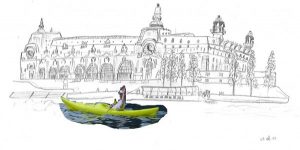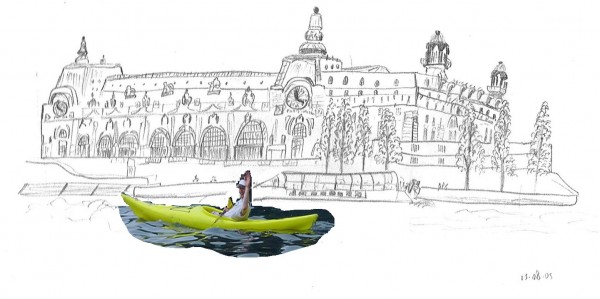Imagination: your key to enjoying memorizing hundreds of words quickly
Do you feel like you your memory capacity for learning lots of new words is holding you back? I certainly felt that way…
When I was given a list of foreign words (German in my case) to learn the meaning of in school, it was always unclear how to actually do this. Nobody ever taught me so much about how to learn things, they just told me what to learn. Since other students were doing much better than me, I logically thought that they were simply smarter than me. They must look at the word once and then it is magically burned into their mind forever. This is a very comfortable and defeatist conclusion most people make when they aren't making much progress with a language, or generally have a weak memory (for people's names, where they put the keys etc.). It's because of an amazing memory that the other person was blessed with at birth, but you just weren't. It never occurs to us, that maybe all we need to do is change our learning method!

The wrong way to learn words
So how was I learning these lists of words in school? I used the classic repeat method. For example, if you wanted to learn that the French word gare means train station, then just say aloud “gare… train station…gare… train station…gare… train station…” dozens or hundreds of times and eventually it will sink in, right?
Well… technically yes. After this mind-numbingly dull exercise you may indeed recognize “gare” as train station when you read it, and you will find a lot of people who have studied a language enough to say that they have no trouble recognizing words when they hear or read them. But when they have to actually speak the language themselves? They want to say the word for train station… it's on the tip of their tongue… but no, it's not coming. Time to fall back to English, or abandon ship and be shy and say nothing!
This method is obviously extremely boring, but more importantly it's very inefficient. A typical language has hundreds of thousands or even millions of words so this is another reason people may think that you do indeed have to be a genius to learn all of them, or it would take years for them to eventually sink in with your current method (if you happen to have a method as bad as the one I used to use).
The right way: have fun and use your imagination!
So today I want to share the way that I currently learn words! If you have your own interesting way, please do share it with us!
I “naturally” have a very poor memory, but through lots of reading (I've definitely not come up with this myself, so I'm sure some readers apply these methods already), I've discovered how other people learn things in a way that is efficient and fun. Schools are great for teaching you facts, but I wish more would teach you learning methods!! (If yours did, you are luckier than I was!)
The obvious problem with my repetition method mentioned above is that there is no actual association. Even if you repeat the pair to yourself a million times you are still not actually linking the two words together, just trying to force them to match in your mind. Even other methods of using the word in as many examples as possible are still relying on something to just magically click in your mind to put these words together.
I am suggesting that all you need to do is create a very amusing, animated, unforgettable image in your mind that links both words to each other! This means that if you are translating either to or from the target language (unlike just from which most people will master easier), you will access the other word just as easily. This is especially important when the words look nothing alike. To demonstrate what I mean, I'll give you two examples that I used myself.
The story of why gare means train station
There is no word in English (at least that I know of) that sounds almost the same as “gar” (with an “ah”, not “ay” sound) so thinking for a moment the closest I could come up with was Garfield, a popular comic strip (and cartoon and even movie) of a fat, lazy and sarcastic orange cat (that talks of course). I also thought of a very specific train station that I used a lot in Valencia in Spain. It is important from the very beginning to make everything colourful and full of details and movement. I imagined the people rushing through the station, under where the timetable can be found, the platform I usually went to, and the machine I would buy the tickets from. Suddenly, there is a big fat orange cat, in very cartoony colours; not your typical tabby cat, but Garfield himself with his trademark sneeky grin.
But he isn't just sitting in the train station (that would be very easy to forget). He is about to miss an important train directly to Bologna for a Lasagna eating competition!! He has his suitcases and sunglasses with him, since he is going on holiday of course, and he is puffing frantically as he runs around trying to figure out which platform his train is going to leave from. It's quite funny that this fat cat has to actually run for the first time in his life. The train is pulling out of the platform but he dashes after it, throws his suitcase on the back compartment, pounces on… and makes it just in time!
With this image, whenever I picture a train station I will always see this ridiculous story of Garfield running through it and that will help me remember to say gare. Conversely, seeing gare and immediately recognising the similarity with Garfield that I assigned it, means that I will see Garfield in a train station. The recall process takes less than a second and barely slows down a nicely flowing conversation.
The story of why první means first
Here's a tougher one, the Czech word první means first. No amount of stretching of the imagination will really get a similarly sounding English word from a word that doesn't even contain a vowel in the middle… so I'll invent vowels and make it easier! Before I tell you my association words, this time I'll tell you a strange story first:
“My moment has finally arrived, after years of training and competitions and hard work, I have done it!! The year is 2012, I'm in the centre of the Olympic Stadium in London and they are presenting me with my prize! The crowds cheer me on, and a tear falls down my cheek as I approach the top position on the podium. But this is no ordinary podium, it's got an area of 3m squared (about 33 feet squared), because I won't be walking onto it… I'm driving onto it of course! It's only fitting considering I am now officially the world's number 1 professional van driver. My skills are unparalleled and the world can finally recognize this as I've won the Van Olympics! They present me with a prize of a small rabbit, which is rather disappointing, especially as it bites me in the leg and ruins my important moment!”
Of course, when I saw první I just looked at the core consonants and made the first word(s) that I could from them: PRVN gave me PRO-VAN, so I came up with this story and linked it to the concept of first (on top of the winning position of a podium). The final í is not as important to include this time because I've seen a lot of adjectives end in í or ý (both pronounced “ee”) in their standard form, so I'd presume that it happens (at least for the moment) unless I have to remember otherwise. I have decided to include a rabbit in associations in Czech when I need to remember that this word is mostly consonants. You can include other specific associations to remember syllable stress etc. if you wish (but better not to do it with gender; I'll get on to noun genders another day!) So when I see the word první, I'll immediately remember my pro van story and associate it with first, and more importantly, when I want to remember the word for first, this story will come to mind, and I'll remember driving my van on the podium at the Olympics, so clearly I'm a pro-van competitor, i.e. první.
This method actually takes less time than you think
What do you think of my stories? They are absolutely ridiculous, with lots of irrelevant background information and emotions thrown in. You have to be as graphic and expressive as possible; that's what makes them so easy to remember!! I can't just put Garfield sitting and doing nothing in some non-descript train station and expect to remember that! In fact, if you have read these stories, I doubt you will forget what these two words mean in a hurry… so I actually try to do this to most new difficult words that I need to learn.
You may think that this is a lot of work; it took you several minutes to read my stories for just two words! It certainly took me longer than that to write them down, but we are talking about your imagination! I came up with all the details of each of these stories in just a few seconds (describing them to another person does indeed take time, but you'll never need to do that; and the speed of thought is much quicker than the speed of speech or typing words-per-minute!!). I find both stories amusing so it was actually fun trying to come up with an association, and I will very easily remember both of these with very little effort. The best part is that you only actually only need these stories a couple of times; then the word really does get “burned” into your memory and you will remember them naturally; especially once they have come up in conversation a small number of times (each time requiring maybe just one second to recall the word; a lot better than scratching your head and desperately trying to remember something that you may have learned in a less efficient way).
In this way, going through lists of vocabulary does not have to be so dull – you can at least try to enjoy yourself! It's hard to be very imaginative at first, and certainly took me a lot of practise (at first it did take me maybe a about minute to create each story), but soon your expressive childhood imagination will come back to you, and you can use funny images from cartoons, TV shows, books, movies etc. in your mini-stories to make them more funny and personally relevant to you. In a short time this quick story-making talent actually becomes second nature and you start to do it much quicker… and you can actually go through a list of dozens of words in just a minute or two, and others may just think that you have an amazing memory! Similar techniques are used to remember large shopping lists, dates of friends' birthdays and phone-numbers etc., so a “naturally” good memory isn't that far out of reach for those of us who are more forgetful! A little Googling into mnemonics and associations for memorising things will give you some more ideas.



Social